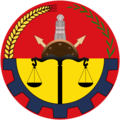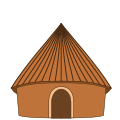| Flag | Date | Use | Description |
|---|
 | | Flag of Addis Ababa | [1] |
 | 2012 | Flag of the Afar Region | The flag has a red triangle at the hoist with three horizontal stripes of blue, white and green in the fly. The regional emblem is placed in the centre of the white stripe. [2] |
 | | Flag of the Amhara Region | The flag of Amhara is golden with a broad red diagonal across the center, charged with a golden star in the center. [3] |
 | | Flag of the Benishangul-Gumuz Region | The flag of Benishangul/Gamuz is a horizontal tricolour of black, gold and green with a red triangle based at the hoist. [4] |
 | 2023-Present | Flag of Central Ethiopia Regional State | [5] |
 | | Flag of Dire Dawa | [6] |
 | | Flag of the Gambela Region | [7] |
 | | Flag of the Harari Region | [8] |
 | | Flag of the Oromia Region | [9] |
 | | Flag of the Sidama Region | [10] |
 | | Flag of the Somali Region | [11] |
 | 2023-Present | Flag of South Ethiopia Regional State | The flag of South Ethiopia Regional State is a horizontal tricolour of green, water blue and red with a yellow triangle based at the hoist. And narrow sized black colo separates all colors. [12] |
 | | Flag of the South West Ethiopia Peoples' Region | [13] |
 | | Flag of the Tigray Region | [14] |





























